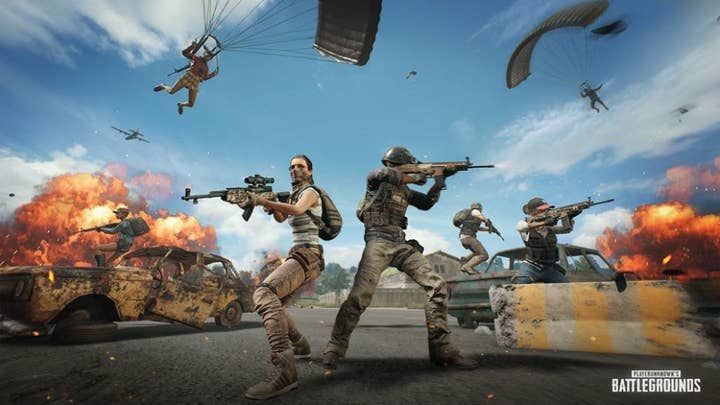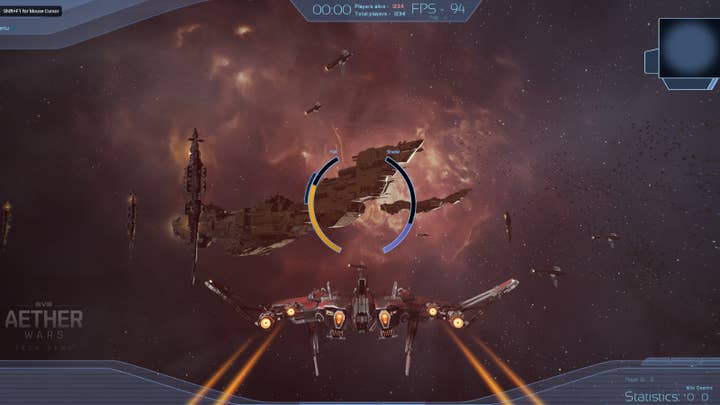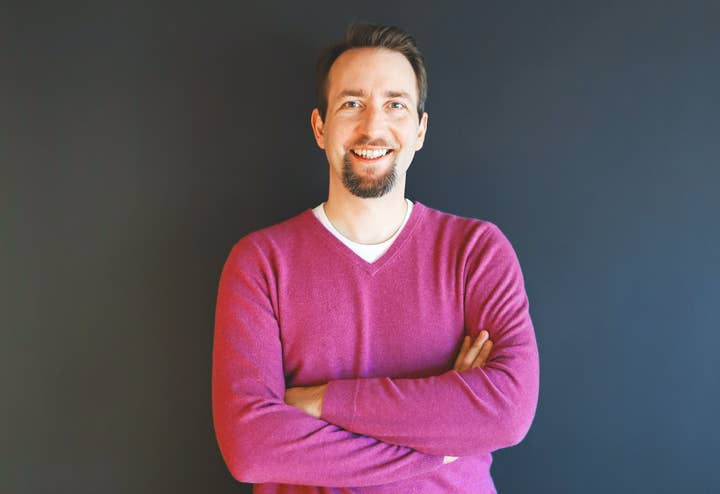Brendan Greene: "I'm done with battle royale"
PUBG designer discusses his move to the new Special Projects team, and the privilege of now working without a deadline
I last spoke to Brendan Greene at EGX Rezzed 2017, just days after the Early Access launch of PlayerUnknown's Battlegrounds.
At the time, Greene was riding high on the game's initial success -- £11m taken in its opening weekend, a staggering start for any title let alone one that is openly still in ongoing development. Yet he had no idea what success lay ahead.
When we met again at GDC 2019 last month, Greene described the last two years as "an insane ride", which is putting it mildly. PUBG went on to become one of the most-played games of the year, dominating headlines for months after its Early Access release. It scored a temporary exclusive deal with Xbox, surpassed the most popular Steam titles for concurrent users -- oh, and kickstarted a shift that saw even the industry's biggest players providing their own battle royale offerings.

Inspired by PUBG's popularity, Epic Games refocused development on Fortnite and continues to reap in millions per month with its last man standing mode. Activision's PUBG-esque Blackout mode for Call of Duty: Black Ops 4 became a main selling point instead of a single-player campaign, and Electronic Arts is still enjoying the success of surprise hit Apex Legends and has just added Firestorm to Battlefield V.
And that's without the likes of Netease's Knives Out, or the countless other titles building on the battle royale concept Greene has helped define throughout his career. With so much competition to his own title, has PlayerUnknown's approach to its design changed at all?
"No, not really," he tells GamesIndustry.biz. "We have our own plan for what we want out of the game. Sometimes, they'll sync up with what other people are doing because we're all in the same space but I love seeing the growth of the battle royale genre. It's been wonderful -- and there's more coming. It's a good genre that has space to grow -- last man standing deathmatches, there are so many different takes you can have on that. I'm still waiting for a For Honor battle royale, something with big, big knives.
"It's wonderful to see this level of creativity around what I thought was a simple idea."
Greene has now moved on, however, to PUBG Corp's new Special Projects division. As announced last month, he'll be based in Amsterdam and working on new types of games experiences. But with PUBG still faring well, particularly on mobile, what brought this move about?
"The last man standing concept is great, but I've done that. I don't really intend to make PUBG 2"
"It wasn't that I wanted to move onto something different, it was that the team we have... you know, I'm super happy with them. They have the reins of battle royale, they know what PUBG and our battle royale is, they understand what we want from the game and what we want to do to it moving forwards, so I saw it as a good chance for me to announce Special Projects."
Announcing ahead of GDC was no accident either, as it better positioned the new team to recruit -- "That's very hard when everything's under NDA," adds Greene. With Special Projects' existence now in the open, he was able to head to San Francisco and talk to potential recruits about what they are doing.
So what are they doing? Greene's quote from the initial announcement post -- "exploring, experimenting, and creating new technologies, tools, pipelines, and gameplay" -- doesn't exactly shed light on the company's purpose, so can he boil it down for us?
"To take what's in here," says Greene, pointing at his head, "and turn it into something that may be playable"
He offers a little more detail on its origins: Chang Han Kim, CEO of PUBG Corp, recognised that Greene had been travelling a lot. Greene, meanwhile, expressed an interest in moving closer to home, if only to be able to see more of his daughter in Ireland. With PUBG Corp already establishing an office in Amsterdam, it made sense for Greene to shift location as well as focus.

While parent company Krafton (formerly Bluehole) searches for its next big hit, Kim gave Greene the chance to form a new team in Europe and experiment, much in the way he had when coming up with his first battle royale mods and titles all those years ago. There was no pressure to start a genre, or redefine an existing one, just the chance to "make something you want to play." That is the purpose of Special Projects.
"I have lots of other ideas in my head for games I would like to play and we're going to see if other people would like to play them too," says Greene. "That's where we're at. We haven't really started anything yet because we're team building."
"I think I've provided others with a good way of killing each other. But I want to explore some other things"
Greene can't go into details "because I don't have them yet", but multiplayer is inevitably still a particular field of interest. He wants to "explore online experiences and how to connect people in ways that we haven't really done before," as well as seeing what new and reimagined technologies might enable.
It's interesting that he uses the phrase "connect people," suggesting his next project might not be as competitive as PUBG. For all the game's influence, encouraging more developers and publishers to put increasing numbers of people in an ever-shrinking arena, the concept still boils down to killing everyone else. Perhaps there's room for an online multiplayer experience that's a little more cooperative.
"That's something we're going to explore," says Greene. "The last man standing concept is great, but I've done that. I don't really intend to make PUBG 2. I've done battle royale, it's time to try something else. There are ideas about how we connect to people and how we provide the different experiences I have."
There was plenty of tech on display at GDC that might help power Greene's next vision. In addition to Improbable's SpatialOS, which we've written about at length, it was also the first big showing for tech startup Hadean. This firm's collaboration with CCP Games saw an EVE Online with just shy of 4,000 players and 10,000 AI ships simultaneously. It's a project that fascinated Greene, although he adds, "I've done the killing thing."
"It's fun," he says, "I think I've provided others with a good way of killing each other. But I want to explore some other things."
Yet for all the ability to bring more players together, this is not necessarily guaranteed to improve upon the likes of PUBG et al. Greene believes battle royale "has an upper limit," pointing to Automaton's promise of 1,000-player battle royale for Mavericks: Proving Grounds.
"I don't think it's going to work," he says, "I think it'll be too big and the matches too long -- but I could be shocked, right? Hadean's demo looked really interesting and their tech, just the way they're thinking about it, it's an interesting paradigm shift."
He continues, "Bigger is not necessarily better. The simplest games have been among the most successful. Look at Minecraft, it's a simple procedural world that breeds massive complexity. Feature creep can obviously affect games and you end up having stuff that you don't need. For me, I always like to keep things simple."

While Greene is somewhat reserved in the pressure he's putting on himself and his new team, externally there will be high expectations for a special project to come out of Special Projects. Greene is often credited as the father of battle royale, given the work he did on the DayZ mod, H1Z1, and of course, PUBG. But is he likely to find another Next Big Thing? There are so few in this industry to have made such lightning strike twice.
"I'd like to see more people making their own battle royales out of pleasure rather than just trying to make a quick buck"
"Oh, yeah, I'm fucked," he admits. "But that's why I feel so lucky to work with PUBG Corp."
He reiterates that Chang Han Kim is placing no pressure on him to find that Next Big Thing. There are no orders to come up with a product PUBG Corp can sell, or to even release something. This is purely about experimentation at this stage, with Greene likening it to EA SEED, the publisher's young R&D division.
"We're not doing this for profit," Greene continues. "Eventually someday, we may do, but right now it's just about having time to explore. There is no deadline here, this is us with a few years to play. Gaming and the industry has become so hard, this is a very lucky thing to have. We can genuinely explore and be curious for some time."
This lack of pressure alone is a testament to how successful PUBG has been in the past two years. £11m is an incredible opening for any game, but to fund an operation like Special Projects, you need to be raking it in on a long-term basis. While much of the industry narrative seems to be that Fortnite has essentially stolen PUBG's lunch money, the company backing Greene isn't exactly dealing in loose change.
"We've been far more successful than any of us ever thought," he says. "But I want to take advantage of this opportunity. I don't want to fritter away years doing stupid things. I'm very lucky to have this year, two years, three years to develop some ideas. It would be foolish of me to just fritter them away because they don't come around all that often. I want to have some fun but also see if we can do some good."
And although Greene may not be directly contributing to the evolution of battle royale in the years to come -- beyond his role as consulting creative director on PUBG -- he's still keen to see where the industry takes the concept, and still has a few aspirations of his own.
"I want to see battle royale esports," he says. "I think the team we have are doing a good job -- it takes a long time to create a successful esport. It doesn't happen overnight, especially the systems and procedures you need to run. I don't care who does it -- I'd love it to be us, I think it will be us -- but that's my dream.
"I'd also like to see battle royale stabilise, and see more people making their own battle royales out of pleasure rather than just trying to make a quick buck. Apex Legends did an amazing job, they didn't hype anything, they just announced and delivered a great game. It's hard to enter the space right now. I don't envy the developer teams with that task."

